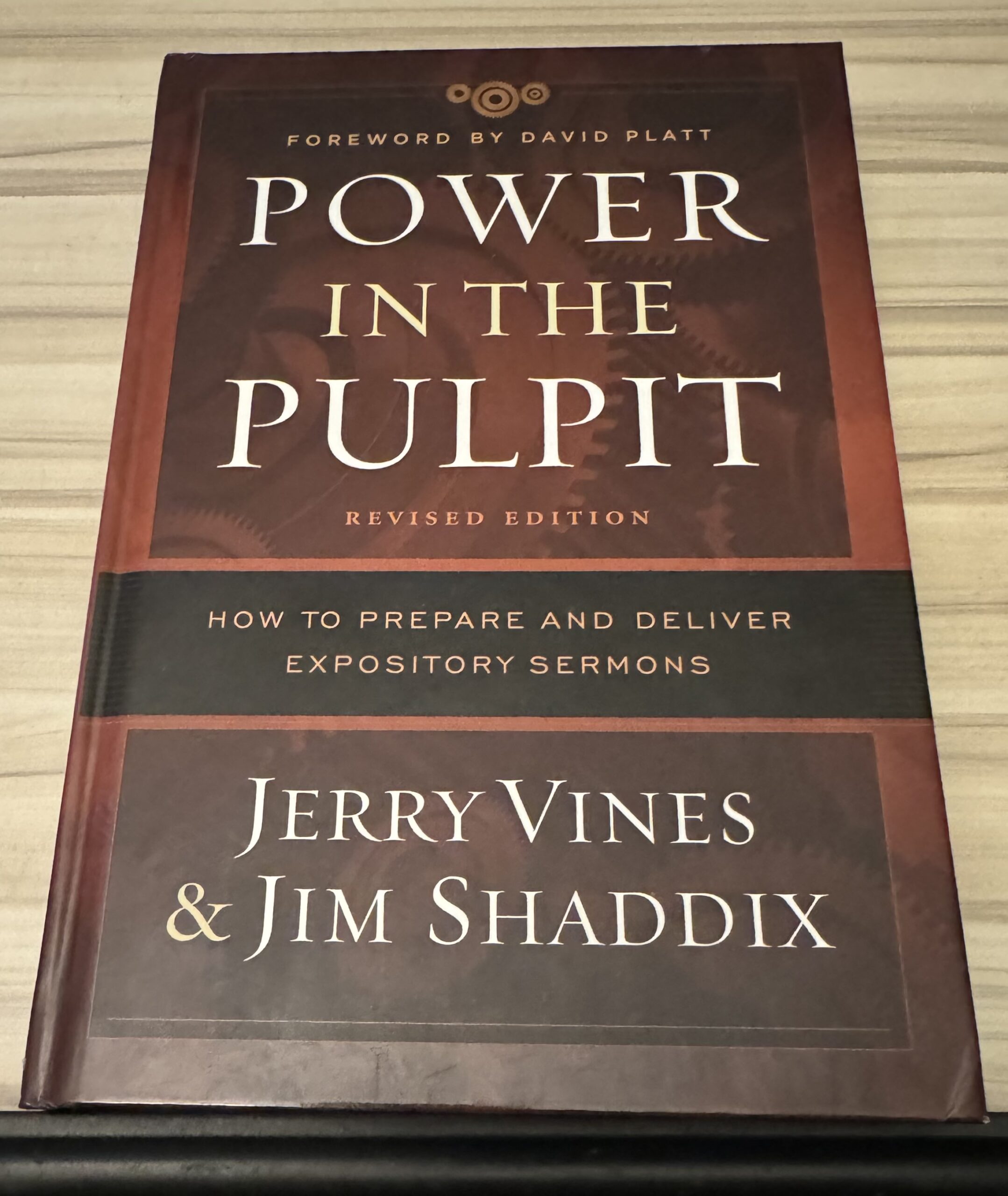Ongoing Notes: Power in the Pulpit
By Jerry Vines and Jim Shaddix
Revised Edition
Introduction:
“Men prepare sermons, God prepares men.” I think this is a great quote.
Chapter 1: Philosophy of Expository Preaching
Expository Preaching: The process of laying open the biblical text in such a way that the Holy Spirit’s intended meaning and accompanying power are brought to bear on the lives of contemporary listeners.
The book emphasized the apostles ordained preaching as the primary method of dispensing the gospel. (25) The apostles “did not cease teaching and preaching that the Christ is Jesus.” (26) It goes to say that the New Testament preachers prioritized teaching of “basic doctrine.” (26) This “basic doctrine” seems to be an overall theme for the chapter, and book, so far.
Under practical application, it tells that preaching is informed by the practical application of God’s Word. (27) It then references that, at times, it can come in the form of encouragement, but also by way of rebuke or conviction. (27)
One thing I enjoyed in the public proclamation section was the following statement: Biblical preachers were not giving a soliloquy. They preached, people listened, and listeners sometimes responded with feedback. (28) Bible preachers were persuaders, preaching was apologetic, men were brought to the point of believing that Jesus was the Christ. (29)
Share faithful exposition of Scripture. (30) Although all truth is God’s truth, He never intended his preachers to speak about every idea under the sun. (31) Those that don’t stick to the basics and relegate God’s stuff to secondary status by focusing on “good stuff”, serious problems arise. (32) Sermon content should be driven by the biblical text. (32) Expository preaching doesn’t need to follow the same form, but it’s a process of God’s Word be communicated so they can be heard and understood by the people preached to. (33)
Paul told Timothy that public reading of Scripture came first, identifying the authority. (34) Start first with God’s Word. I like what the author says here: if the explanation of what the author (or preacher) meant is missing, so is the heart of Bible exposition. (35) Since the Bible is the very Word of God, it demands to be studied minutely. (36)
The Bible is the Spirit-inspired record of God’s voice. (38) I like how the author expressed the aim: Preaching is an all-out assault on the depraved nature of human beings for the purpose of transforming them into Christlikeness. (38) The ultimate goal is life change in the listeners. (39) Every sermon must be prepared and delivered to persuade people to say yes and have a work of transformation within their hearts. (39)
Hermeneutics: science of studying and interpreting what a passage of Scripture means. (41)
Exegesis: interpretation or explanation. Exegesis is the actual use and application of good hermeneutics. (42)
Homiletics: art and science of saying the same thing the text of Scripture says. (44)
General exposition: art of explaining the text of the Word of God using life experience to teach and illuminate the exposition. (47)
Systematic exposition: the consecutive and exhaustive treatment of a book of the Bible. (47)
I like that the author included from 2 Timothy that a time is coming when people will not endure sound teaching. (48) He uses that to emphasize the importance of faithful and sound preaching now. (48)
He notes a few key topics:
Biblical Literacy – tells the profit of systematic, book-by-book approach to preaching and teaching. (50)
Accountability – you speak from the authority of the Bible, and not your own. When speaking Words of scripture, you can proclaim “Thus saith the Lord.” (50)
Protection – the Holy Spirit will apply the truth, it’s up to use to teachers and preachers to provide a balanced diet of exposition. (51)
Stress Relief – When preaching through a book or from the bible, it frees the preacher or teacher to focus on the study of the passage rather than coming up with a topic. (52)
Appetite Development – emphasis that Bible study leaders can be developed in this way. (52)
Spiritual Maturity – God’s people will come through with great triumph if they are fed a solid Bible diet. (54) Bible preaching makes for a strong and healthy congregation. (54)
Areas to watch for while preaching:
Dullness – Warning to not become pedantic and stale. God’s Word is innately alive and powerful. (55)
Irrelevancy – True expositors are answering questions people *should* be asking. (55)
Monotony – Expository preaching depends not so much on length, but on the manner of its treatment. (56) It’s OK to break from the norm and throw in different “miniseries” , a series-within-the-series, to break the monotony and expound on ideas. (56)
Spiritlessness – Do not limit yourself to strict series by series, but it’s OK to insert a new direction or series, and then return to “home base.” (57)
Formlessness – Prepare beyond reading a commentary or two. (57)
Detail Overload – Do not make the mistake of trying to examine and break down every minute part of each verse, of each passage. (57)
Chapter 1: Conclusion
So far, the book has done a good job looking at expository preaching and study.
